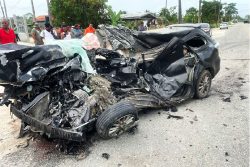In anticipation of local government elections this year, the Guyana Human Rights Association (GHRA) says the empowerment of women must start at the community level, where ordinary women are encouraged to become active and contest for seats outside of the political party system.
As Guyana joins the world in observing International Women’s Day today, GHRA called for an increased focus on empowering Guyanese women through the local government system. This, according to the human rights body, is the most sustainable and effective starting-point to secure women’s security, rights and status.
In a statement to mark the occasion, which is celebrated annually on March 8, GHRA said that little attention has been paid to the reforms in the electoral process which provide for much greater involvement of citizens who are not members of political parties. The body pointed out that fifty percent of the seats in all local government elections are contested by ordinary (i.e. non-party) citizens. As a result, women do not need to bother with seeking quotas for these seats, and can put up candidates for all of them. Already, one-third of the other fifty percent of seats contested by party lists, have by law, to be assigned to women.
In light of this, GHRA said local government elections could become transformative with respect to the rights and status of women. “Apart from the issues which pertain solely to women, local government bodies dominated by women would hopefully operate more transparently than is the case at present,” the group added.
But it observed that the major challenge of such an approach is that neither the current image nor the reality of politics is attractive to women – that is, it is dominated by men, by discord and distrust and stuck in ethnic division and corruption. “Moreover, females currently in public life at the national level are not yet sufficiently numerous to impact on this unappealing image. Thus, most dynamic and creative women remain largely outside of formal politics and those in a position to exercise real power are few and fractured between various parties,” GHRA said. It continued: “The options seem to come down, on the one-hand, to non-party activism from the side-lines and, on the other, restricted but real inside influence. However, the time has perhaps come when this situation has to be addressed more openly.”
GHRA said too that grassroots women readily meet the requirements for political involvement in the community given their local knowledge, experience and involvement in farming, home-making and related community activities. More important, the human rights body said the women engaging in local government need accompaniment rather than leadership from civil society, including providing networks of support, solidarity, information, connections and advice. It also noted that initiatives driven by professionals, external money and other factors which include local influence are prone to identify the wrong problems and select the wrong tools.
Further, GHRA observed that while the rights of women are being progressively realised in Guyana through increased legal provisions, there has been no rigorous implementation of the laws. It said the easy targets for criticism are bodies such as the police and the courts, but that the problems may also relate to their capacity rather than the willingness to embrace change. Consequently, civil society then implements different strategies, such as naming and shaming.
According to GHRA, naming and shaming remain effective tactics for generating emergency responses to individual cases of victims of trafficking or police brutality, but leaves the inefficient implementing legal or administrative machinery largely intact. “A point frequently overlooked is that every case of abuse that attracts national attention takes place in a locality or neighbourhood and the lack of institutional capacity to address it is usually located in local police stations, health centres, magistrates courts and village councils,” it added.








